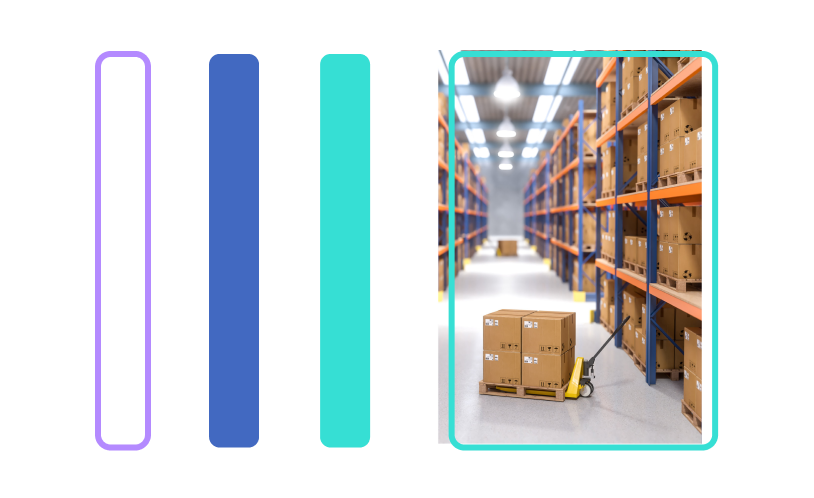Building a robust supply chain with an adequate inventory management process is crucial for any business looking to scale up its operations. But, as a small to medium-sized business, you may not have the same amount of resources to run a dedicated division as some big companies do.
That’s why Third-Party Logistics or 3PL Inventory Management may be a financially efficient alternative.
Looking for price quotes for your next shipment?
What is a 3PL?
Third-party logistics companies – or 3PLs – deliver supply chain management solutions that enable businesses to outsource their warehousing, inventory management, delivery, and order fulfillment needs. This way small companies can delegate a part or all supply chain operations.
Hiring a 3PL means that you don’t have to raise capital to hire manpower or rent a physical space for warehousing.
3PL companies often have their own warehouses and advanced technology which they can use for inventory management and order fulfillment. They may also own or rent a fleet of transportation vehicles to provide shipment services. Companies that don’t want to spend too much money on managing supply chain and logistics can rely on 3PL services to grow their business.
What is 3PL Inventory Management?
Inventory that gets sold turns into revenue for the business. On the other hand, inventory that sits in a warehouse keeps your cash tied up.
That’s why it is essential for businesses to maintain a balance so in order to fulfill demand without overinvesting in stock. 3PL inventory management helps you identify what products need to be ordered and when, and will monitor the inventory you order from the date of purchase to the sale of products.
3PL companies also provide you with a digital inventory management system so you can keep an eye on the stock levels on your own. This helps you making informed decisions based on data, analytics and business insights.
3PL Inventory Management Services and Benefits
It is important for entrepreneurs and small businesses to figure out if they need 3PL inventory management. Some of the common reasons that businesses retain 3PL services include:
- The time and cost of in-house inventory management are too high
- You are looking to scale up your business without too much overhead
- You want access to software-based data and insights for better decision making
- You want to expand the business into multiple territories
- You want to focus on business growth instead of concentrating on operations
3PL inventory management offers a diverse variety of benefits including:
- Real-Time Access to Stock Levels
When you outsource inventory management to a third-party logistics provider, you can always monitor stock levels in real-time regardless of where you are. With twenty-four-hour transparency, it becomes easier to manage your orders and ensure you never run out of stock. Moreover, inventory management software can generate client reports, provide secure login, and deliver shipping notifications.
- Quick & Easy Operational Scalability
As most of the 3PL inventory management relies on a pay-as-you-go business model, it becomes much easier for your company to scale up its operations without having to make a substantial investment. This also allows you to manage seasonal demand fluctuations efficiently and get accurate billing for all transactions.
- Better Distribution Network
Even if you are in a position to operate a warehouse in the city you are located, going beyond that footprint can be a challenge. That’s where a 3PL inventory management service with a wide network throughout the country and beyond can help you serve customers in multiple cities and even countries.
Top 3PL Inventory Management Companies
While there is a multitude of 3PL inventory management companies, some of the top players in the sector include:
- Shipwire – Shipwire provides 3PL fulfillment services across the globe with its 145 warehouses. The company specializes in leveraging technology for inventory and supply chain management.
- UPS – UPS is one of the highly trusted companies in the global logistics space providing its services in 220 countries with 596 warehouses in the US alone.
- FedEx – Being the most popular name in the warehousing and logistics sector, FedEx provides services in over 200 countries with its 130 warehouses.
How to Find the Best 3PL for Your Business
Before you can choose the right 3PL inventory management partner, it is important to evaluate your requirements and objectives. Review the services provided by potential 3PL service providers along with the feedback of their clients. Some of the key factors that you should take into account include compatibility with your organizational technology stack, automation features, warehouses and their locations, value-added services, and pricing.
3PL inventory management FAQs
- How much does 3PL inventory management cost?
Some 3PL companies charge a flat rate which can be anywhere between $70 and $300 depending on your inventory management requirements. You can also go for a per-hour rate which may set you back $30-$70 an hour.
- How do I find the right 3PL for inventory management?
Compare different 3PL services and identify the ones that you need, then check whether a specific company suits these shipping and inventory management needs. Once you have a 3PL, use Freightos.com platform to book and manage your international freight – including shipping to your 3PL warehouse.
- How much 3PL space do I need?
This is an estimate that will be provided to you by the 3PL inventory management service. You may have to provide some information for accurate estimation.
- Is Freightos.com a 3PL?
No. Freightos.com is an online booking platform – not a logistics provider. This means that Freightos.com can help when it comes to finding shipping to a 3PL service provider warehouse, but will not be providing these services directly.
To learn more about 3PL check out our other guides including 3PL Warehousing Solutions, (3PL) Third Party Logistics Providers, How Does 3PL Work, and Third-Party Fulfillment.



